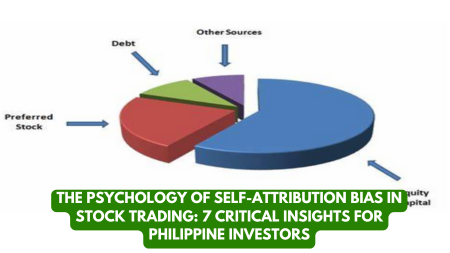No products in the cart.
Stock Market
The Psychology of Self-Attribution Bias in Stock Trading: 7 Critical Insights for Philippine Investors
The Psychology of Self-Attribution Bias in Stock Trading: 7 Critical Insights for Philippine Investors

In the dynamic world of the Philippine Stock Exchange (PSE), successful investing is not just about numbers, charts, and financial analysis. It’s equally about understanding the intricate psychological mechanisms that drive investment decisions. One of the most pervasive and potentially destructive psychological biases that investors encounter is self-attribution bias – a cognitive distortion that can significantly impact investment strategies and long-term financial success.
Understanding Self-Attribution Bias: A Psychological Deep Dive

Self-attribution bias is a fascinating cognitive phenomenon where individuals tend to attribute their successes to personal skill and their failures to external factors beyond their control. In the context of stock trading, this means investors are likely to credit their profitable trades to their superior investment acumen while blaming market volatility, economic conditions, or other external circumstances for their losses.
The Mechanism Behind the Bias
When an investor makes a successful trade in the Philippine Stock Market, such as profiting from a rally in blue-chip stocks like Ayala Corporation or SM Investments, they are prone to believing that their success stems entirely from their analytical skills and investment prowess. Conversely, when a stock like PLDT or BDO Unibank experiences a downturn, the same investor might quickly attribute the loss to unpredictable market conditions or macroeconomic factors.
The Philippine Stock Market: A Unique Landscape for Psychological Biases
The Philippine Stock Exchange presents a particularly interesting environment for exploring self-attribution bias. With its relatively smaller market capitalization compared to global exchanges and higher volatility, the PSE offers numerous opportunities for investors to experience both significant gains and losses.
Factors Amplifying Self-Attribution Bias in the Philippine Context
- Market Volatility: The PSE is known for its periodic fluctuations, which can create an environment where investors feel they have more control than they actually do.
- Limited Financial Education: Many retail investors in the Philippines may lack comprehensive financial literacy, making them more susceptible to psychological biases.
- Social Media and Online Trading Platforms: The rise of digital trading platforms has made it easier for investors to share and compare their successes, potentially exacerbating self-attribution tendencies.
The Dangerous Consequences of Self-Attribution Bias
Overconfidence and Risk-Taking
When investors consistently attribute their successes to personal skill, they become increasingly confident in their abilities. This overconfidence can lead to:
- Excessive risk-taking
- Neglecting proper risk management strategies
- Ignoring diversification principles
- Making increasingly larger and more speculative investments
Inability to Learn and Improve
Self-attribution bias creates a significant barrier to learning and improvement. By consistently deflecting blame for losses, investors prevent themselves from:
- Conducting honest self-assessments
- Identifying genuine areas of weakness
- Developing more robust investment strategies
- Learning from past mistakes
Recognizing and Mitigating Self-Attribution Bias
1. Maintain a Detailed Trading Journal
Keeping a comprehensive trading journal is crucial. Document not just the trades, but the reasoning behind each decision, including:
- Entry and exit points
- Emotional state during trading
- Market conditions
- Personal biases and assumptions
2. Embrace Objective Performance Metrics
Utilize objective performance metrics that remove emotional bias:
- Calculate precise risk-adjusted returns
- Compare performance against market benchmarks
- Use statistical analysis to evaluate trading strategies
3. Continuous Learning and Education
Invest in continuous financial education through:
- Workshops and seminars
- Professional trading courses
- Books on behavioral finance
- Webinars focusing on Philippine market dynamics
4. Seek External Perspectives
- Engage with investment clubs
- Participate in online forums
- Consult with financial advisors
- Discuss strategies with experienced traders
Psychological Techniques for Overcoming Bias
Cognitive Reframing
Practice cognitive reframing techniques that help:
- Acknowledge both successes and failures objectively
- Understand that luck plays a significant role in investment outcomes
- Develop a growth mindset focused on continuous improvement
Mindfulness and Emotional Regulation
Implement mindfulness practices to:
- Reduce emotional reactivity
- Improve decision-making clarity
- Maintain composure during market volatility
Case Studies: Self-Attribution Bias in Action
Case Study 1: The Overconfident Tech Investor
A young investor who made substantial profits during the 2020-2021 tech stock boom believed his success was purely due to his investment skills. When the market corrected, he suffered significant losses by maintaining the same aggressive strategy.
Case Study 2: The Resilient Value Investor
An experienced investor who recognized her own biases maintained a disciplined approach. By continuously reviewing her strategies, accepting both wins and losses, and adapting her approach, she consistently outperformed the market.
Conclusion: A Balanced Approach to Investing
:max_bytes(150000):strip_icc()/activetrading3-5bfc2b9ac9e77c005143f2fe.jpg)
Self-attribution bias is not an insurmountable challenge. By understanding its mechanisms, recognizing its presence, and implementing strategic approaches to mitigate its impact, investors can develop more robust, rational, and successful investment strategies.
The key lies in maintaining humility, embracing continuous learning, and understanding that successful investing is a complex interplay of skill, strategy, and sometimes, unpredictable market dynamics.
Final Thoughts
In the ever-evolving landscape of the Philippine Stock Market, self-awareness is your most valuable asset. Recognize your biases, stay curious, and never stop learning.
Disclaimer: This blog post is for informational purposes only and should not be considered financial advice. Always consult with a qualified financial advisor before making investment decisions.
READ MORE RELATED BLOGS!
READ MORE AND SHARE!
TSOK Chronicles: Unleashing Passion, Dedication, and Excellence in 2024
2023 Your Practical Wedding Guide
Investments and Finance Ultimate Guide
If you like this article please share and love my page DIARYNIGRACIA PAGE Questions, suggestions send me at diarynigracia@gmail.com
You may also follow my Instagram account featuring microliterature #microlit. For more of my artworks, visit DIARYNIGRACIA INSTAGRAM


Peace and love to you.